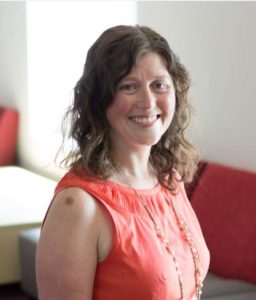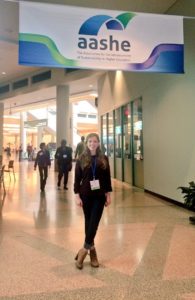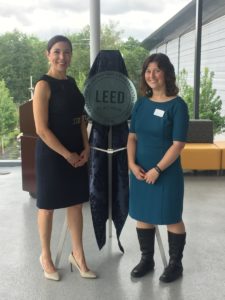 Bentley University’s Assistant Director of Sustainability, Natalie Hayes, recently shared how she advances sustainability at an institution that primarily focuses on business, accounting and finance in this month’s Member Spotlight!
Bentley University’s Assistant Director of Sustainability, Natalie Hayes, recently shared how she advances sustainability at an institution that primarily focuses on business, accounting and finance in this month’s Member Spotlight!
As many practitioners in the sustainability field can relate, there is no typical work day. Ms. Hayes works on a multitude of projects with long to do lists to help keep her organized. A few projects she is particularly proud of are: Alternative Transportation Week, the Food for Free program and the Delongchamp Family Fund grant.
Alternative Transportation Week
With Alternative Transportation Week, Ms. Hayes provides an entire week of activities around different modes of transportation to help educate students, faculty and staff about how they can make more sustainable decisions in getting to and from campus. Encouraging alternative transportation at Bentley University is challenging because all faculty and staff members can park for free. However, an education campaign that demonstrated the health and wellness benefits of biking or walking, as well as the reduction in traffic by carpooling or taking the bus, showed that the number of single drivers has decreased for a second year in a row.
Food for Free
The institution also participates in a food donation program by partnering with a local non-profit organization called “Food for Free.” At Bentley, leftover prepared food is packaged, frozen and picked up by Food for Free who packages it into individual meals so it can be donated to people in need throughout the Greater Boston Area. Bentley has donated more than 8,000 pounds of food since the program launched a year ago. “Helping those in transitional housing or high school students who are in food insecure areas over the weekend allows Bentley University to give back to its community while abiding by the Massachusetts Food Waste Ban: keeping leftover food from being thrown in the trash. “Ms. Hayes shared.
Delongchamp Family Fund
 Thanks to the generosity of a Bentley University alumnus, Ms. Hayes now oversees the Delongchamp Family Fund where students can apply for funding of up to $1,000 toward a co-curricular sustainability experience such as attending the AASHE Conference & Expo or completing a sustainability focused project on campus. More than 20 students have applied in the past three years. A grant of this type helps to make sustainability education opportunities more accessible to the student body, and as a result, creates more allies to advance the institution’s triple bottom line (people, planet, profit) goals.
Thanks to the generosity of a Bentley University alumnus, Ms. Hayes now oversees the Delongchamp Family Fund where students can apply for funding of up to $1,000 toward a co-curricular sustainability experience such as attending the AASHE Conference & Expo or completing a sustainability focused project on campus. More than 20 students have applied in the past three years. A grant of this type helps to make sustainability education opportunities more accessible to the student body, and as a result, creates more allies to advance the institution’s triple bottom line (people, planet, profit) goals.
“Most Bentley students are here to study business, so I try to talk to them about triple-bottom line thinking and give them examples of companies employing sustainability business practices,” Ms. Hayes shared when discussing the importance of incorporating sustainability throughout the core of an institution. “We do our best to engage with people by meeting them where they are. Interested in investing? Make sure your investment portfolio considers environmental, social and governance factors at each company. It’s important to figure out what is important to your audience and then explain the impact that sustainability can have.”
 One example of meeting people where they are while also keeping sustainability in mind was the building of the Bentley Arena that opened earlier this year. This building became the first standalone arena to achieve LEED Platinum status. The Office of Sustainability was included on The Bentley Arena building committee from the outset and through thoughtful conversation and patience the office was able to show the other committee members that sustainable design of this building could benefit the hockey team, athletic department and the community all through the institution’s triple bottom line lens. While challenging to pull together, the Bentley Arena represents a huge win for sustainability!
One example of meeting people where they are while also keeping sustainability in mind was the building of the Bentley Arena that opened earlier this year. This building became the first standalone arena to achieve LEED Platinum status. The Office of Sustainability was included on The Bentley Arena building committee from the outset and through thoughtful conversation and patience the office was able to show the other committee members that sustainable design of this building could benefit the hockey team, athletic department and the community all through the institution’s triple bottom line lens. While challenging to pull together, the Bentley Arena represents a huge win for sustainability!
Some of the challenges to incorporating sustainability throughout the institution experienced are not unique to Bentley. Ms. Hayes took comfort in that when she attended the 2018 AASHE Sustainability Leadership Workshop and heard from other professionals in the field. “I came back with friendships from all over the country, and a different perspective on thinking about and approaching sustainability efforts that focuses on behavior change. This workshop and the Conference & Expo provide me an opportunity to network, collaborate and bounce ideas off of my peers,” Ms. Hayes said.
What challenges are you experiencing to advance sustainability at your campus? What tactics have you tried to overcome them already? Share in the comments below!